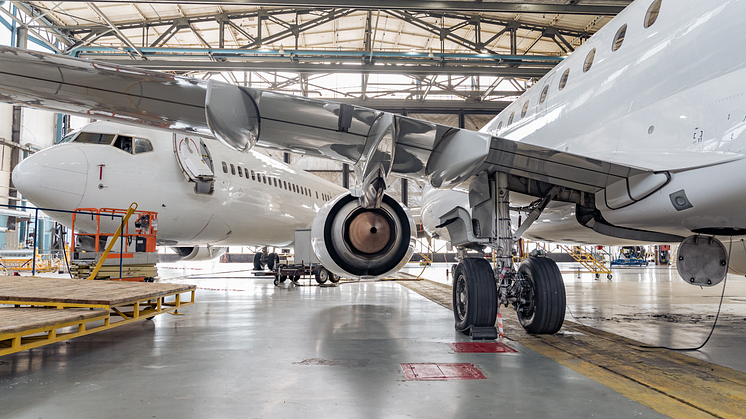
Blog post -
Etraveli Group x SkyNRG: Expanding capacity of Sustainable Aviation Fuel
The aviation industry is at a turning point. Through our partnership with SkyNRG, Etraveli Group is playing a vital role in reducing the environmental impact of air travel by supporting the development of SkyNRG’s first Sustainable Aviation Fuel (SAF) production facility. We spoke with SkyNRG to explore the challenges, opportunities, and the long-term commitments needed to make a significant impact.
What is SAF?
Sustainable Aviation Fuel (SAF) is a renewable, alternative to fossil jet fuel. Here’s what makes SAF a game-changer:
- Sourced from renewable materials: SAF is produced using waste products like used cooking oil, agricultural and forestry residues, and non-food crops.
- Significant emissions reduction: SAF cuts greenhouse gas emissions by 65-94% compared to conventional jet fuel over its lifecycle.
-
Seamless integration: SAF is a "drop-in" fuel, meaning it can be used with existing aircraft engines, fuel systems, and airport infrastructure without modifications.
Can you describe the collaboration between ETG and SkyNRG? Why is this partnership important?
ETG has been a member of SkyNRG’s Board Now program since 2020, actively supporting the growth of the SAF industry by committing to purchase SAF from SkyNRG's Delfzijl (DSL-01) facility for a minimum of five years. This collaboration is crucial for strengthening the business case for new SAF capacity and supporting the fossil fuel phase-out in the aviation sector.
What long-term impact do you foresee SAF having on the travel industry, and how is SkyNRG preparing for this?
The SAF market is expected to see substantial growth. By 2030, global SAF capacity is projected to reach 17 million tons, driven by regulatory mandates and voluntary corporate commitments. This growth ensures a broader availability of SAF for airlines and corporations alike.
SkyNRG is gearing up for this surge in demand by exploring innovative production methods and scaling up its SAF facilities. We currently have projects in the Netherlands, the United States, and Sweden.
What challenges and opportunities has SkyNRG faced so far?
One of the primary challenges is the significant investment required to build SAF production facilities. However, the increasing demand for SAF, driven by airlines, cargo companies, and corporations with ambitious emission reduction targets, presents a tremendous opportunity. Collectively, the industry aims to produce 12 million tons of SAF by 2030, which will drive further growth.
Stephen Wetmore, Team Manager, Partner Engagement commented on the collaboration: “Etraveli Group has been our partner since 2020, demonstrating a commitment to sustainability and innovation in aviation. Supporting Sustainable Aviation Fuel is a tangible step toward reducing aviation's climate impact. To scale production, a strong market demand and long-term commitments from partnerships like this are essential.”
What factors are needed to make SAF the preferred air fuel option, and what is the timeline for its widespread adoption?
A crucial factor for SAF adoption is its status as a "drop-in" fuel, meaning it can replace conventional jet fuel without needing any modifications to aircraft or infrastructure. This makes SAF easier and faster to integrate into aviation.
Global regulations, such as the EU’s ReFuelEU Aviation regulation, will also drive SAF adoption. Starting in 2025, fuel suppliers must blend at least 2% SAF with kerosene, with the target increasing to 70% by 2050. These policies provide a clear and supportive framework for SAF’s widespread adoption in aviation.
What are the next steps for SkyNRG?
SkyNRG is transitioning from being a SAF supplier to a producer, with several production facilities under development worldwide. To continue scaling the SAF industry, we need long-term commitments and investments in a variety of production pathways.
Currently, the Hydroprocessed Esters and Fatty Acids (HEFA) pathway dominates, representing about 85% of announced capacity. While HEFA will remain the primary source of SAF in the near term, emerging technologies like Alcohol-to-Jet (AtJ) offer promising diversification opportunities.
We believe that SAF holds great potential. With scalable feedstocks and strong policy support, SAF is essential for enabling the aviation industry to reach its 2050 net-zero emissions target.
Why SAF Matters
By supporting initiatives like SAF, we can contribute to reducing aviation emissions. As demand for SAF increases and production capacity expands globally, we are committed to advancing this change. In collaboration with SkyNRG and other industry partners, we are working to reduce reliance on fossil fuels and support the shift to renewable fuel alternatives.

